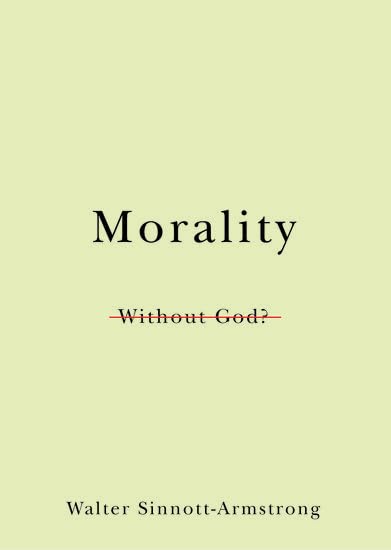Morality without God?
Written by Walter Sinnott-Armstrong Reviewed By Stephen WitmerIn this witty, learned, and engaging book, the first of a new series called “Philosophy in Action,” Walter Sinnott-Armstrong, editor of the series and professor of philosophy and legal studies at Dartmouth College, sets out to disprove the popular slogan that “if God is dead, everything is permitted.” In place of that view, Sinnott-Armstrong attempts to demonstrate that morality has “nothing essentially to do with religion” (p. xii).
For several reasons, the book is of particular interest to evangelicals. First, Sinnott-Armstrong, who was an evangelical Christian before becoming an atheist, takes evangelical Christianity as his chief sparring partner. Second, Sinnott-Armstrong is in some respects an atypical atheist. He critiques New Atheists Christopher Hitchens and Richard Dawkins. More significantly, he believes in objective morality and moral universals. He disavows subjectivism, relativism, egoism, nihilism, and postmodernism (pp. 75–76). Third, Sinnott-Armstrong frequently quotes Scripture, offering interpretive comments and conclusions. He suggests, “Bad moral advice is not just an occasional aberration in the Bible. There’s lots of it” (p. 143).
The structure of the book’s argument is simple. Sinnott-Armstrong divides into five distinct claims the view that morality depends on religion and God and then argues against each of those claims in successive chapters. Chapter 2 contests the view that “all atheists … are morally bad.” While admitting that some atheists do bad things, Sinnott-Armstrong argues against the claim that atheists perform immoral acts (or are on balance immoral) because they are atheists. Drawing on evidence from numerous studies and focusing on behaviors that both theists and atheists consider immoral (so-called “neutral tests of depravity” such as homicide and theft), chapter 3 disputes the claim that secular societies are bound to become corrupt and depraved.
Chapters 4–5 constitute the heart of the book’s argument and seek to disprove the notion that “objective morality makes no sense, has no firm foundation, or cannot exist without God.” Chapter 4 lays out Sinnott-Armstrong’s own positive, harm-based understanding of morality. On this view, an act is immoral if it causes harm (e.g., death, pain, or disability) to another person for no adequate reason. Sinnott-Armstrong argues that his harm-based morality establishes objective morality. Chapter 5 then goes on the offensive by critiquing a thorough-going divine command theory of morality, the view that “what makes immoral acts immoral is that God commanded us not to do them” (p. 94).
The rest of the book builds on the central argument of chapters 4–5. Chapter 6 contests the claim that “atheists … have no adequate reason to be moral” by asserting reasons for morality based on the harm-based morality proposed earlier in the book. Chapter 7 argues against the claim that “atheists … cannot know what is morally right and wrong without guidance from God or from religious scriptures or institutions.” While admitting there are difficult moral dilemmas, Sinnott-Armstrong suggests that through collaborative discussion, consensus can often be reached that leads to justified moral belief and even moral knowledge. Finally, chapter 8 concludes by reflecting upon the impact of the overall argument. Calling for more civility and fairness on the part of both theists and atheists and for a move beyond liberal-conservative dichotomies, Sinnott-Armstrong advocates a re-thinking of political policy on the basis of his harm-based morality.
Though well-written, entertaining, and provocative, this book has significant problems. Not least is a pervasive misunderstanding of both particular Scripture passages and basic hermeneutical principles. For example, in several places Sinnott-Armstrong advances a naïve and caricatured interpretation of Matt 12:31 and in other instances does not appear to be aware of even basic principles for how the Mosaic Law might be applied to NT believers. This naïveté suggests that Sinnott-Armstrong does not understand the position of his chief discussion partners.
The most significant problem of the book, however, is a failure to achieve its stated goal of demonstrating that morality does not depend upon the existence of God. The main trouble with Sinnott-Armstrong’s harm-based morality is not so much that it is wrong as that it is superficial. For instance, Sinnott-Armstrong claims that rape is morally wrong because it harms the victim for no adequate reason. But why is it immoral to harm someone for no adequate reason? Sinnott-Armstrong offers no compelling answer to this question. His attempt at an answer runs in three steps. First, we recognize it as morally wrong if someone harms us for no adequate reason. Second, we have no reason to claim special moral status for ourselves. Therefore, it is morally wrong for us to harm someone else for no adequate reason. The problem with this argument is that it fails to explain the first premise, i.e., why it is morally wrong for someone else to harm us. Sinnott-Armstrong claims that if you don’t believe it is immoral for someone to harm you, you must “admit that everyone in the world is allowed to [harm you] whenever he or she feels like it” (p. 63) and that this possibility is “abhorrent.” But this argument is weak. You need not claim it is immoral for others to harm you in order to avoid admitting that anyone can harm you. You may simply claim that it is inconvenient or undesirable.
Sinnott-Armstrong also fails to offer adequate motivation for acting morally. He argues in chapter 6 that atheists can logically act on nonegoistic reasons. Suggesting that a reason is “a fact with rational force,” Sinnott-Armstrong claims that atheists are not irrational in seeking to avoid harming others and in seeking to do good to others, and therefore they have adequate reasons for acting in a moral way toward others. These reasons offer motivation for individuals “as long as they care about other people” (p. 118), which most people do. But it is here Sinnott-Armstrong’s case falters, again because it is superficial. He fails to address the more basic question: why should people care about others, particularly when it is not to their advantage? He offers no compelling reason.
I am glad that Walter Sinnott-Armstrong wants to be moral by seeking to help others and avoiding harming them, but after reading this book I remain unconvinced that as an atheist he has any consistent, compelling reason for doing so.
Stephen Witmer
Stephen Witmer is the pastor of Pepperell Christian Fellowship in Pepperell, Massachusetts, is an editorial board member of Themelios, and teaches New Testament at Gordon-Conwell Theological Seminary.
Other Articles in this Issue
I didn’t come from an Evangelical home, and though he never told me outright, I’m sure my father never wanted me to become a pastor...
Does Baptism Replace Circumcision? An Examination of the Relationship between Circumcision and Baptism in Colossians 2:11–12
by Martin SalterReformed paedobaptists frequently cite Col 2:11–12 as evidence that baptism replaces circumcision as the covenant sign signifying the same realities...
New Commentaries on Colossians: Survey of Approaches, Analysis of Trends, and the State of Research
by Nijay GuptaNew Testament scholarship in its present state is experiencing a time of abundance, especially with respect to biblical commentaries of every shape, length, level of depth, theological persuasion, intended audience, and hermeneutical angle...
It might seem odd to write an editorial for a theological journal on the topic of not doing theology and how important that can be; and, indeed, perhaps it is contrarian even by my own exacting standards...
Most readers of Themelios will be aware that the word “perfectionism” is commonly attached in theological circles to one subset of the Wesleyan tradition...







